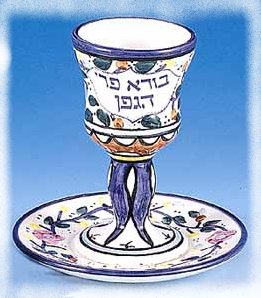The Shabbat is the seventh day of the week, from Friday evening to Saturday evening.
It is a fundamental principle of Judaism.
Like Gd who created the universe and all its contents in six days
and rested from His work on the seventh,
the Jew ceases his working week a few moments before the night on Friday to devote himself entirely to Gd,
body and spirit, on the holy day of Shabbat.
 |
| A Kidoush cup |
On Shabbat, Shabat, certain activities are prohibited (build, cook, carve, buy, write, ...), because they flow from the main tasks involved in building
the Temple of Jerusalem [11], a symbol itself of the creation of the world by Gd.
But the essence of Shabbat is to leave aside the tasks of the week to make room for Gd on the day when He completed the world, making up room for the Man.
 |
Shabbat bread:
Chala |
The day of Shabbat should be an occasion to celebrate with family, to empty one's mind of worries and material duties of the week, in order to delve into
the study of the
Torah and welcome in one's house and mind the Oneg Shabbat, the well-being of Shabbat, perpetual gift of Gd to the Jews so they always follow the path of the Creator to bring the reign of Good.
Yehuda Halevi wrote in Quzari (book 2, line 50) : « Whoever believes in the Shabbat as the day on which the work of Creation stopped, admits the Creation with no doubts ; thus he acknowledges the existence of a Creator who made the world.
But whoever does not believe in Shabbat falls into the difficulties of the doctrine of eternity, and cannot have a perfect faith in the Creator of the universe.
The observance of the laws of Sabbath bring the people closer to God more than monasticism, asceticism and hermitism. »
Every Shabbat, in the synagogues, we read the parsha, a weekly portion of the Torah scroll.
The Shabbat begins Friday at sunset, and ends Saturday night after nightfall. The Shabbat times therefore depend on location and date throughout the year.




 the Jewish calendar
the Jewish calendar